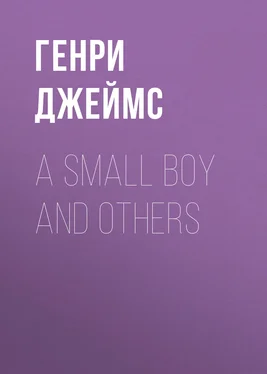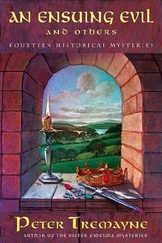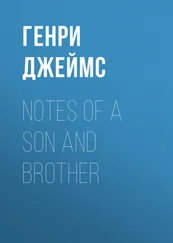Генри Джеймс - A Small Boy and Others
Здесь есть возможность читать онлайн «Генри Джеймс - A Small Boy and Others» — ознакомительный отрывок электронной книги совершенно бесплатно, а после прочтения отрывка купить полную версию. В некоторых случаях можно слушать аудио, скачать через торрент в формате fb2 и присутствует краткое содержание. Жанр: foreign_prose, foreign_antique, на английском языке. Описание произведения, (предисловие) а так же отзывы посетителей доступны на портале библиотеки ЛибКат.
- Название:A Small Boy and Others
- Автор:
- Жанр:
- Год:неизвестен
- ISBN:нет данных
- Рейтинг книги:5 / 5. Голосов: 1
-
Избранное:Добавить в избранное
- Отзывы:
-
Ваша оценка:
- 100
- 1
- 2
- 3
- 4
- 5
A Small Boy and Others: краткое содержание, описание и аннотация
Предлагаем к чтению аннотацию, описание, краткое содержание или предисловие (зависит от того, что написал сам автор книги «A Small Boy and Others»). Если вы не нашли необходимую информацию о книге — напишите в комментариях, мы постараемся отыскать её.
A Small Boy and Others — читать онлайн ознакомительный отрывок
Ниже представлен текст книги, разбитый по страницам. Система сохранения места последней прочитанной страницы, позволяет с удобством читать онлайн бесплатно книгу «A Small Boy and Others», без необходимости каждый раз заново искать на чём Вы остановились. Поставьте закладку, и сможете в любой момент перейти на страницу, на которой закончили чтение.
Интервал:
Закладка:
Henry James
A Small Boy and Others
I
In the attempt to place together some particulars of the early life of William James and present him in his setting, his immediate native and domestic air, so that any future gathered memorials of him might become the more intelligible and interesting, I found one of the consequences of my interrogation of the past assert itself a good deal at the expense of some of the others. For it was to memory in the first place that my main appeal for particulars had to be made; I had been too near a witness of my brother's beginnings of life, and too close a participant, by affection, admiration and sympathy, in whatever touched and moved him, not to feel myself in possession even of a greater quantity of significant truth, a larger handful of the fine substance of history, than I could hope to express or apply. To recover anything like the full treasure of scattered, wasted circumstance was at the same time to live over the spent experience itself, so deep and rich and rare, with whatever sadder and sorer intensities, even with whatever poorer and thinner passages, after the manner of every one's experience; and the effect of this in turn was to find discrimination among the parts of my subject again and again difficult—so inseparably and beautifully they seemed to hang together and the comprehensive case to decline mutilation or refuse to be treated otherwise than handsomely. This meant that aspects began to multiply and images to swarm, so far at least as they showed, to appreciation, as true terms and happy values; and that I might positively and exceedingly rejoice in my relation to most of them, using it for all that, as the phrase is, it should be worth. To knock at the door of the past was in a word to see it open to me quite wide—to see the world within begin to "compose" with a grace of its own round the primary figure, see it people itself vividly and insistently. Such then is the circle of my commemoration and so much these free and copious notes a labour of love and loyalty. We were, to my sense, the blest group of us, such a company of characters and such a picture of differences, and withal so fused and united and interlocked, that each of us, to that fond fancy, pleads for preservation, and that in respect to what I speak of myself as possessing I think I shall be ashamed, as of a cold impiety, to find any element altogether negligible. To which I may add perhaps that I struggle under the drawback, innate and inbred, of seeing the whole content of memory and affection in each enacted and recovered moment, as who should say, in the vivid image and the very scene; the light of the only terms in which life has treated me to experience. And I cherish the moment and evoke the image and repaint the scene; though meanwhile indeed scarce able to convey how prevailingly and almost exclusively, during years and years, the field was animated and the adventure conditioned for me by my brother's nearness and that play of genius in him of which I had never had a doubt from the first.
The "first" then—since I retrace our steps to the start, for the pleasure, strangely mixed though it be, of feeling our small feet plant themselves afresh and artlessly stumble forward again—the first began long ago, far off, and yet glimmers at me there as out of a thin golden haze, with all the charm, for imagination and memory, of pressing pursuit rewarded, of distinctness in the dimness, of the flush of life in the grey, of the wonder of consciousness in everything; everything having naturally been all the while but the abject little matter of course. Partly doubtless as the effect of a life, now getting to be a tolerably long one, spent in the older world, I see the world of our childhood as very young indeed, young with its own juvenility as well as with ours; as if it wore the few and light garments and had gathered in but the scant properties and breakable toys of the tenderest age, or were at the most a very unformed young person, even a boisterous hobbledehoy. It exhaled at any rate a simple freshness, and I catch its pure breath, at our infantile Albany, as the very air of long summer afternoons—occasions tasting of ample leisure, still bookless, yet beginning to be bedless, or cribless; tasting of accessible garden peaches in a liberal backward territory that was still almost part of a country town; tasting of many-sized uncles, aunts, cousins, of strange legendary domestics, inveterately but archaically Irish, and whose familiar remarks and "criticism of life" were handed down, as well as of dim family ramifications and local allusions—mystifications always—that flowered into anecdote as into small hard plums; tasting above all of a big much-shaded savoury house in which a softly-sighing widowed grandmother, Catherine Barber by birth, whose attitude was a resigned consciousness of complications and accretions, dispensed an hospitality seemingly as joyless as it was certainly boundless. What she liked , dear gentle lady of many cares and anxieties, was the "fiction of the day," the novels, at that time promptly pirated, of Mrs. Trollope and Mrs. Gore, of Mrs. Marsh, Mrs. Hubback and the Misses Kavanagh and Aguilar, whose very names are forgotten now, but which used to drive her away to quiet corners whence her figure comes back to me bent forward on a table with the book held out at a distance and a tall single candle placed, apparently not at all to her discomfort, in that age of sparer and braver habits, straight between the page and her eyes. There is a very animated allusion to one or two of her aspects in the fragment of a "spiritual autobiography," the reminiscences of a so-called Stephen Dewhurst printed by W. J. (1885) in The Literary Remains of Henry James; a reference which has the interest of being very nearly as characteristic of my father himself (which his references in almost any connection were wont to be) as of the person or the occasion evoked. I had reached my sixteenth year when she died, and as my only remembered grandparent she touches the chord of attachment to a particular vibration. She represented for us in our generation the only English blood—that of both her own parents—flowing in our veins; I confess that out of that association, for reasons and reasons, I feel her image most beneficently bend. We were, as to three parts, of two other stocks; and I recall how from far back I reflected—for I see I must have been always reflecting—that, mixed as such a mixture, our Scotch with our Irish, might be, it had had still a grace to borrow from the third infusion or dimension. If I could freely have chosen moreover it was precisely from my father's mother that, fond votary of the finest faith in the vivifying and characterising force of mothers, I should have wished to borrow it; even while conscious that Catherine Barber's own people had drawn breath in American air for at least two generations before her. Our father's father, William James, an Irishman and a Protestant born (of county Cavan) had come to America, a very young man and then sole of his family, shortly after the Revolutionary War; my father, the second son of the third of the marriages to which the country of his adoption was liberally to help him, had been born in Albany in 1811. Our maternal greatgrandfather on the father's side, Hugh Walsh, had reached our shores from a like Irish home, Killyleagh, county Down, somewhat earlier, in 1764, he being then nineteen; he had settled at Newburgh-on-the-Hudson, half way to Albany, where some of his descendants till lately lingered. Our maternal greatgrandfather on the mother's side—that is our mother's mother's father, Alexander Robertson of Polmont near Edinburgh—had likewise crossed the sea in the mid-century and prospered in New York very much as Hugh Walsh was prospering and William James was still more markedly to prosper, further up the Hudson; as unanimous and fortunate beholders of the course of which admirable stream I like to think of them. I find Alexander Robertson inscribed in a wee New York directory of the close of the century as Merchant; and our childhood in that city was passed, as to some of its aspects, in a sense of the afterglow, reduced and circumscribed, it is true, but by no means wholly inanimate, of his shining solidity.
Читать дальшеИнтервал:
Закладка:
Похожие книги на «A Small Boy and Others»
Представляем Вашему вниманию похожие книги на «A Small Boy and Others» списком для выбора. Мы отобрали схожую по названию и смыслу литературу в надежде предоставить читателям больше вариантов отыскать новые, интересные, ещё непрочитанные произведения.
Обсуждение, отзывы о книге «A Small Boy and Others» и просто собственные мнения читателей. Оставьте ваши комментарии, напишите, что Вы думаете о произведении, его смысле или главных героях. Укажите что конкретно понравилось, а что нет, и почему Вы так считаете.











